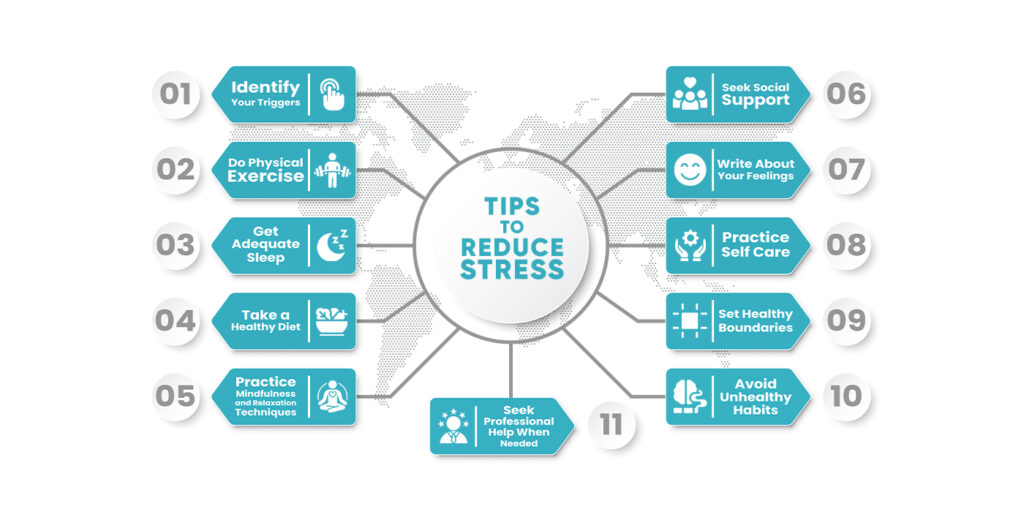In today’s fast-paced world, stress has become an unwanted companion for almost everyone. Whether it’s because of work, personal relationships, or financial worries, it can feel quite overwhelming. It doesn’t only affect your mood and energies but also has a negative impact on your physical health.
However, it doesn’t have to rule your life. By learning to manage it effectively, you can take charge of your mental and physical well being. In this blog we’ll explore the strategies and tips to reduce stress so you can lead a happier, healthier, and more peaceful life.

1. Identify Your Triggers:
Being aware of the causes or triggers of your stress is the first step towards its effective management. Depending upon the stage of their life, there are many factors or situations that can be a cause of stress for someone. It can be because of some work or job problem, relationship issues, financial problems etc.
Try to recognise the cause of your stress, by keeping record of what you were doing, or where you were, when you started feeling stressed. It might help you identify your triggers. Once you know the cause, you’ll be able to handle the situation and your reaction in a better way.
2. Do Physical Exercise:
Doing regular physical exercise is one of the best ways to uplift your mood and enhance your overall well-being. Exercise stimulates release of endorphins, also known as “feel good” hormones. These are natural mood boosters and can help reduce stress, and make you feel better.
Try to make a routine of taking at least 30 minutes out of your day to do some physical activity, which will support your physical as well as mental health. You can try activities like;
- Walking
- Swimming
- Cycling
- Yoga
- Strength training
- Stretching
3. Get Adequate Sleep:
Getting adequate restful sleep is very important for your physical as well as mental health. Lack of sleep can make you more prone to mood swings, irritability, and fatigue, which can worsen your condition. Having good sleep hygiene improves your ability to manage your stress.
Here are some sleep hygiene tips you can try to improve your sleep;
- Create a comfortable sleeping environment by making your room cool, dark, and quite
- Stick to a consistent sleep schedule. Try to go to bed and wake up at the same time every day
- Make a relaxing bedtime routine like reading a book or taking a warm shower before going to bed
- Avoid screens at least an hour before your bedtime
- Limit caffeine intake later in the day to avoid sleep disruption
4. Take a Healthy Diet:
Your diet can affect your mood and energy levels. You should have a healthy and balanced diet as it provides your body with essential vitamins and minerals for brain and body functions.
Try to stay well hydrated by drinking at least 8 glasses of water a day or more if you are physically active, and incorporate the foods in your diet that are known to help reduce stress. These foods include;
- Avocado
- Dark chocolate
- Nuts
- Blueberries
- Leafy greens
- Chamomile tea
5. Practice Mindfulness and Relaxation Techniques:
Mindfulness means staying present in the moment, which can reduce worries about the future or regrets of the past. Practicing mindfulness helps to break the cycle of negative thinking and triggers the relaxation response.
You can try different relaxation techniques like;
- Deep breathing
- Meditation
- Progressive muscle relaxation
- Yoga
- Aromatherapy
6. Seek Social Support:
You do not have to face stress alone. Reaching out to your friends and family so you can talk about your feelings with someone you trust can make a big difference. This makes you feel heard, validated and supported. Opening up about your feelings with your loved ones helps release emotional tension and allows others to offer perspective, encouragement, or simply a listening ear.
If you find it hard to open up, you can start small. You do not have to share everything all at once, just letting someone know that you are going through a tough time can be the first step towards relief.
Remember, asking for support is a sign of strength, not weakness!
7. Write About Your Feelings:
Writing down your feelings in a diary or on your computer will help you let your feelings out. After letting go of the bottled up feelings and emotions, you’ll feel much relaxed. It serves as a personal space to express yourself honestly. You can write down anything that comes in your mind, or any emotion that you are feeling. No one else has to read it, write freely without worrying about grammar, spellings or sentence structure. You can either toss it away, or keep it to read later if you want.
8. Practice Self Care:
Self care plays an important role in managing stress. Try to make self care a regular part of your routine rather than making it an occasional treat. It helps you feel relaxed and improves your overall well being.
Self care can be different for everyone, so try to choose the activities you enjoy that make you feel relaxed. You can try self care activities like;
- Taking a relaxing bath
- Reading a book
- Meditation
- Connecting with nature
- Enjoying a hobby like baking or painting
9. Set Healthy Boundaries:
Learn to say “no” when needed, and set healthy boundaries with others. This will help reduce extra pressure on your mind and feelings of overwhelm. You should prioritise your own needs and take time to identify your limits. Reflect on what you are comfortable with and be realistic with what you can commit to and what you can’t.
Remember, setting healthy boundaries is not selfish, it’s essential.
10. Avoid Unhealthy Habits:
Although smoking cigarettes, drinking alcohol or taking excessive caffeine might feel like an easy option to get away from your worries temporarily, these things poorly affect your mental and physical health in the long term. Try to cope with your situation by practicing healthy and effective ways. Stay away from these unhealthy habits, as they can worsen your condition in the long term.
11. Seek Professional Help When Needed:
If you feel like you have tried and are still not being able to manage your condition, or if it is getting worse, you should consult with a professional. They can help you manage your condition effectively by providing you with coping strategies, tailored to your condition.
You can also contact organisations like mind to get help & guidance regarding your stress and other mental health concerns.
Hope these tips to reduce stress were helpful for you!
Final Thoughts:
Stress may be an inevitable part of life but it does not have to take over. By incorporating some simple yet effective tips to reduce stress in your daily routine, you can take charge of your well-being. Whether it is getting enough rest, eating healthy, setting boundaries, or simply making time for what you enjoy, each step counts towards a balanced and peaceful life. Your mental health matters, and making it a priority is one of the best things you can do for yourself.
If you are stressed out due to any reason or having a burn out, and need some time off work or school to focus on your well-being, you may need a sick note to officially communicate your absence. You can get a sick note online, by an EU licensed doctor, from the comfort of your home. So you don’t have to deal with additional worry about required documentation and focus on your recovery.








